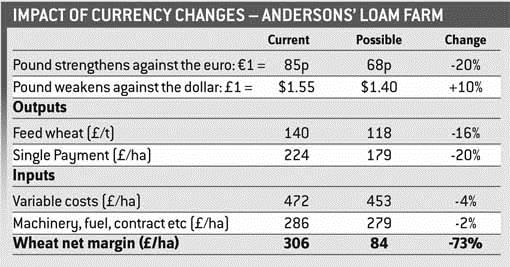Farmers warned to prepare for weaker euro

Farmers should be future-proofing their businesses now to prepare for a possible dramatic weakening of the euro against the pound.
Businesses should use the current better profitability in most sectors to set themselves up to cope with potentially more difficult times, said Oliver Lee of farm business consultant Andersons, speaking at this week’s LAMMA show.
Despite problems in the Eurozone, the currency had remained remarkably strong over the past two years. However, the euro had recently weakened from €1=87-88p to around 82-83p, and he believed it could slip further unless the Eurozone crisis was solved.
“A value below 80p is quite likely. Recent rates are not particularly typical of the short history of the euro. During the mid-2000’s the exchange rate was around €1 = 68p.”
A return to those levels, implying a 20-25% strengthening of sterling, would have serious consequences for farm profitability, he said. “CAP reform may have been taking all the headlines recently, but this is potentially far more important.
“A strong pound against the euro has a triple-whammy effect – it makes our exports to the single market less competitive, it makes imports from Europe relatively cheaper, and the sterling value of the single payment is reduced.”
If the pound were to strengthen to mid 2000s levels, that could slash the UK’s total income from farming figure by at least 50% to around £3bn.
On an individual farm level the effects would be dramatic, said Mr Lee (see table). The 2012 harvest budget for Andersons’ Loam Farm model (600ha of wheat, OSR and beans, 40% owned and 60% FBT) shows a sharp fall in arable income as prices and single payment tumble. Costs also decrease, but by much less, so the net result is a 73% fall in the crop margin.
“Simply having low costs of production is the best way of dealing with uncertain markets and currency values, as the business will continue to be profitable at a wider range of prices.”
Anticipating currency effects on grain values was tricky, he admitted. “Most farmers won’t be totally comfortable to interpret the data and make a decision. Talk to someone you trust.”
Other important measures include:
* Having a marketing plan – most arable farmers sold on the spot market but have no plan at all for next season making it difficult to lock in to prices, with most selling on the spot market.
* Reviewing how currency-sensitive inputs are bought. Hedging fuel and feed is now possible. Experience shows it always pays to buy fertiliser early in the season – cash flow permitting.
* Shopping around for better deals.

